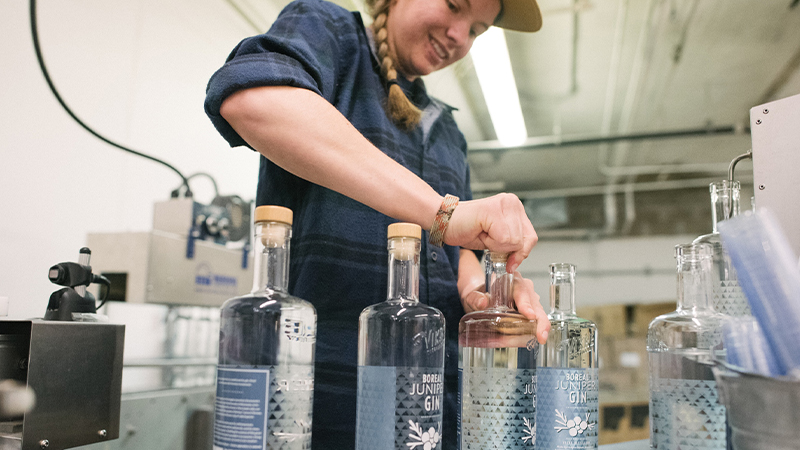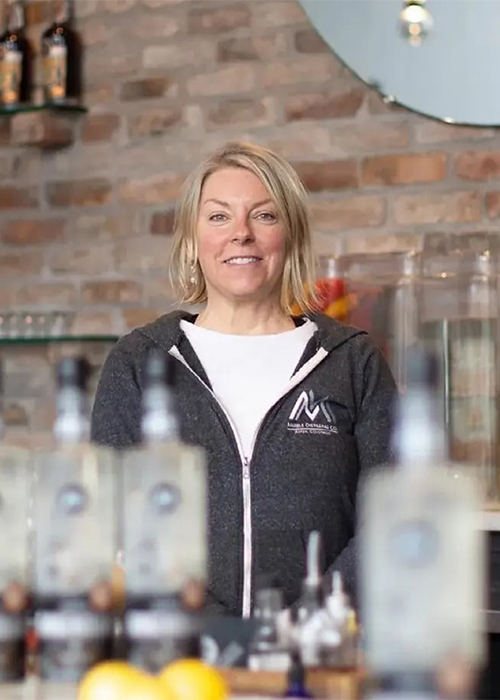“We started to look for money,” says Mhairi Voelsgen, recalling her initial attempt to raise capital for a whiskey distillery a decade ago. But when she was told during a pitch session that no one was going to give $3 million to a woman, she knew she would not be able to fund her dream.
The experience was disheartening, says Voelsgen, now founder and CEO of organic botanical distillery BroVo Spirits. A veteran marketing strategist descended from a long line of strong women, Voelsgen says they would be disappointed she and other females still face these roadblocks. “Like most women, I always have felt I can do anything, am equal to anyone, there’s nothing I can’t take on and do,” she says. “I still believe that, but I’ll tell you, the road has been really tough.”
Voelsgen pivoted to craft niche artisan liqueurs and in 2019 was named a James Beard Foundation Award semifinalist. BroVo, which also produces amaro, vermouth, and vodka, sold 18,000 cases last year and is on pace to double that in 2022.
Nevertheless, Voelsgen is still frustrated that male distillers like Copperworks Distilling Company, also in Seattle, easily raise millions while she’s tried three VC rounds with modest success in the first two. “All in, we’re less than $3 million into the distillery, and for our age and the amount of product that we move through here, that’s remarkable,” Voelsgen says.
Voelsgen’s story is emblematic of many women who want to enter the distilling industry. Despite the explosion in the craft alcohol sector over the past 15 plus years; Constellation Brands’ 2018 launch of its “Focus on Female Founders,” a $100 million investment in female-led startups by 2028; and the renewed social and cultural focus on women entering this male-dominated arena, it remains especially difficult for women to obtain funding.

Venture Capital: Viable or Not?
“We all know those stats, it’s less likely for women to get funded,” says Suzanne Henricksen, founder of The Crafty Cask, a craft alcohol media and marketing consulting company, about the oft-quoted 2017 statistic that women-led businesses only receive 2 percent of venture capital funding. Noting the work, effort, and energy that could be expended toward building a brand rather than a wasted funding effort, she says, “it’s not surprising to me at all that a lot of people are taking the other path.”
Notably, most of the female founders interviewed for this article did not secure VC funding to kick-start their businesses and opted for other routes instead. They often want to work with other women to support them, says Henricksen, and are leery of ceding control or decision-making, which isn’t uncommon in the male-dominated VC world.
For her “wilderness distilled” Vikre Distillery, Emily Vikre raised operating capital from family and friends, securing many small investors who are passionate about a distillery benefiting the community rather than about quick returns on investment. A bank loan for equipment was easily obtained, she thinks, because her husband was in the room, though she is the CEO and has a Ph.D., and he doesn’t have a management role. Since launching in 2014, her original investors have reinvested; she has otherwise used cash flow to expand her business.
VCs give lip service to wanting to fund women-led businesses, but ultimately claim they can’t find them, Vikre says. “Those networks that make the connections when you start looking for advisement, mentorship, or financial connections make such a difference,” she says. “And they just aren’t in place in the same way for women.”
Vikre believes VCs seek and fund based on a particular conception of qualities they think a founder should possess, making even being in front of these opportunities more challenging. “There are kinds of cultural differences in the expectations of how you present yourself, how ambitious you come across, how much bravado you have, and how cutthroat you seem,” she says. Like Voelsgen, Vikre agrees VCs look more for a unicorn than well-considered, sustainably growing, intelligent companies.
Taylor Foxman, founder and CEO of The Industry Collective, which works with beverage and alcohol founders and venture capital companies looking to invest in the space, doesn’t think VCs focus more on flashy ideas. But she believes having an executive visibility strategy is important, advising her clients on social media strategies, including the headshot displayed, who they engage with, what they post and how often, and determining if they are in the right conferences, networking groups, and founder councils. “Are you a thought leader in a wider category?” poses Foxman, who says the founder focus is key for consumers, investors, and media who want to know who’s behind the bottle and the brand.
“I am wondering whether there are more women who are pursuing other opportunities that feel like they can nurture a project in a different way,” says artist Rachael Petach, who was chasing her personal dream when she created C. Cassis, a black currant liqueur, in 2020. “A liqueur,” she jokes, “based on a fruit no one fucking knows about.”
More comfortable starting small with somewhat modest sales goals, Petach was wary of giving up a large piece of her business or scaling up rapidly, often requisite VC demands. She raised $100,000 through a small group of family and friends and a simple agreement for future equity (SAFE), an instrument used by startups that affords investors equity once a trigger point is reached. Planning ahead, despite concerns, she is considering trying an equity round.
Connie Baker, CEO and head distiller of Marble Distilling Company (MDC), and her husband mortgaged all they had and procured funds from family and friends to assemble working capital to open MDC in 2015. Her business plan, two years in the making, featured three liqueurs and vodka to create alternate revenue streams and cash flow while aging whiskey. She also wanted to open an inn to have ready-made customers.
Despite construction experience and previously owning a successful pharmaceutical communications company, Baker was turned down by eight banks over two years, including ones she’d previously worked with, until finally securing a construction loan for just $1.7 million to build on land she already owned. Wondering why none of the bankers had any faith in her and her track record, a “pretty flabbergasted” Baker “chalked it up to being a woman,” she says.
Today, her inn is popular, and MDC, which prides itself on being a zero-waste distiller, will double last year’s 10,000-case production of whiskey, vodka, and liqueurs.

Gender Differences in Fundraising
In fundraising specifically, “I do think men have more competence,” says Foxman. Men, she says, “are willing to ask and be relentless, to be quite honest, in terms of getting in front of really anyone who they think could help move their business forward from a financial perspective.”
She doesn’t think VCs focus more on male-led businesses, but, in her experience, says women reach a point where they don’t want to push harder, mentioning a female founder she knows who, for now, has given up on fundraising. While Foxman does not necessarily agree with that decision, she says many of the woman founders she’s worked with decide to “keep on keepin’ on,” versus continuing to plow through.
Why? Women may simply feel more comfortable reaching out to family and friends because they are less confident in their skills, abilities, and are a little more risk-averse, says Henricksen, who is self-funded for partially the same reason. “Owing money to someone else is scary when you’re new to something,” she says.
Petach agrees. “Those people have a little bit of predilection towards believing in you,” she says. “They’re not looking at you the way that an investor or a stranger would.”
Foxman encourages approaching out-of-the-box investors and honing in on what she calls a “so what?” or unique selling perspective, which may greatly differ from stakeholder to stakeholder. “Your ‘so what’ has to be very tailored to that community,” she says, specifying benefits to them because “they have thousands of people reaching out and pressure from people who put money into what they’re doing. They need a bet on the right jockey and there’s a hundred things they’re thinking through.”
Voelsgen acknowledges Constellation’s “great” efforts at closing the funding gap and wants more companies to participate and focus on female-driven companies. “There should be an acknowledgment and effort directed at bringing more people into the tent,” she says.
“I think the more that we can talk about the financial barriers, or the things people face getting into industries that feel inspiring to them,” says Petach, “the more we’re going to see opportunities for people who might not otherwise get into those fields to express themselves in that way. I think that’s only going to make things better.”
This story is a part of VP Pro, our free platform and newsletter for drinks industry professionals, covering wine, beer, liquor, and beyond. Sign up for VP Pro now!
